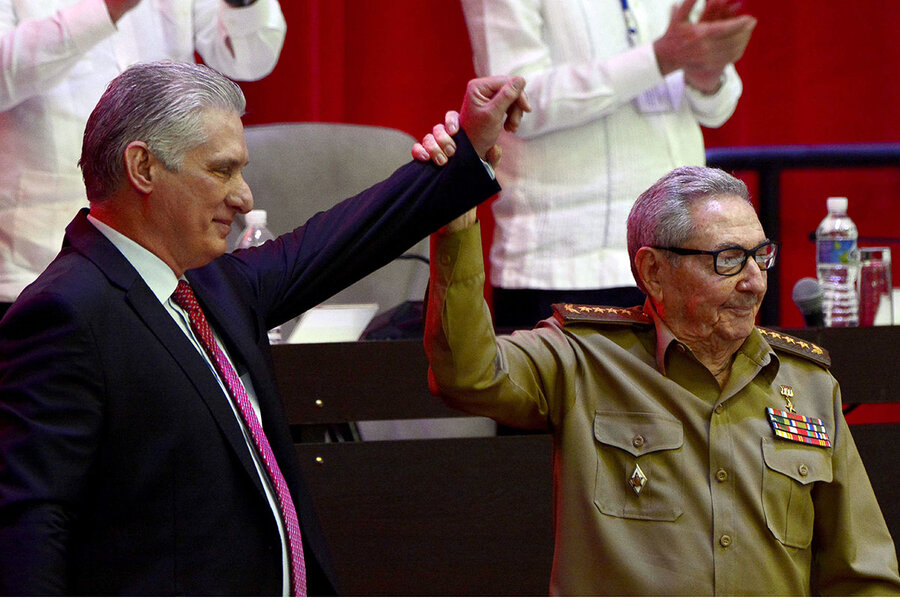Cuba after the Castros: Three questions
Loading...
| Mexico City
For the first time in more than 60 years, there is no Castro at the helm of Cuba’s communist government. Raúl Castro stepped down on April 19, though observers suspect he will remain the most influential person on the island. But that doesn’t mean Cuba hasn’t changed since the 1959 revolution that lifted Mr. Castro and his late brother Fidel to power. From an opening economy to wider internet access, the island has slowly seen significant changes to human rights and freedoms.
Why is Mr. Castro stepping down?
The move was expected: Mr. Castro pledged in 2018 to step down as head of Cuba’s Communist Party this year. Announcing his retirement last week, dressed in his iconic olive fatigues, he said he’s “fulfilled his mission and [is] confident in the future of the fatherland.” He will be replaced by President Miguel Díaz-Canel, who succeeded him as president in 2018 and represents a younger generation of Castro loyalists. Mr. Castro isn’t the only member of the old guard retiring this year: A handful of big-name leaders of his generation will also be stepping aside.
Why We Wrote This
Cuba, communism, and the Castros – for decades, the three have been tightly interwoven. Symbolically, younger brother Raúl’s retirement is a stark change. But what will it really mean for the island?
Mr. Castro carried the torch of the Castro name and the imagery of Cuba’s revolution, but he also pushed the communist state to adapt to a new reality during his time at the helm, agreeing to talks with the Obama administration that ushered in (short-lived) changes in Cuba’s relationship with the United States.
In his speech, he gave a nod to his impending role behind the scenes, even without a formal title: “As long as I live I will be ready with my foot in the stirrup to defend the homeland, the revolution, and socialism with more force than ever.”
What does this mean for Cuba?
This leadership change is happening amid one of the worst economic crises in decades. Cuba’s economy shrank by 11% last year, amid the pandemic, currency reforms, and restrictions enacted by the Trump administration. All of this combined hit hard the sources of income lots of Cubans – and the government – depend on, like tourism and remittances. But many hope some chains will come off with Mr. Castro’s departure, which might make long-needed economic reforms easier to push through the one-party system.
“This should clear the way for stepping up the pace on economic reform,” says William LeoGrande, a Cuba expert at American University.
Without their predecessors’ revolutionary bona fides, Communist leaders of the new generation are expected to be more beholden to the demands of the population to validate their leadership. This won’t mean a reversal of the centralized, communist system – in fact the theme of this year’s Communist Party meeting was “continuity.” But it could lead to loosened restrictions on private business or breaking into long-held government monopolies. The government has already opened up sales of beef and dairy products to parties other than the state.
What is life like in Cuba today?
Some observers are calling the economic situation in Cuba – rife with long food lines and shortages – the worst since the so-called special period that followed the fall of the Soviet Union. Although things are bad, the environment in Cuba is completely different than it was in the 1990s, says Dr. LeoGrande.
“I think the political perils the government faces are probably higher because of the changed circumstances: Cuban society is more heterogenous than it was then … inequality is more visible today,” he says. “And then, of course, there’s the internet.”
If the past several years serve as an example, Cuba can expect to see and hear more from its citizens and dissidents itching for change. Late last year the government came under historic pressure from artists and activists, who took to the streets after videos of police detaining protesters were caught on cellphones and shared widely online. Increased internet access has allowed activists to raise awareness around everything from violence against women and freedom of expression to animal rights.
Of course, access to regular internet is still pricey, limiting who can tap into the tool. And freedoms of expression and gathering – although less stringent than several decades ago – are still limited on paper and in practice, with the government continuing to crack down on those who speak out against it.






